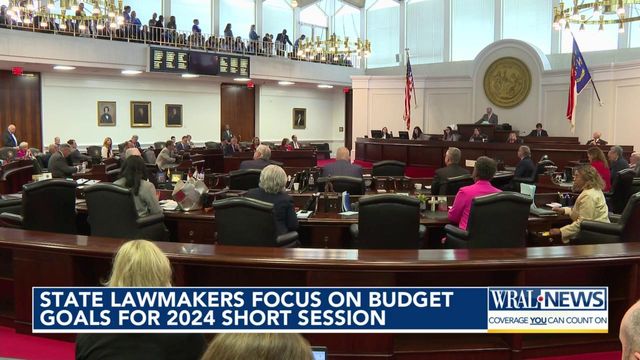Marijuana, immigration, election laws: NC's 2024 legislative session not just about the budget
As state lawmakers kicked off the 2024 legislative session Wednesday, special interest groups on both sides of the aisle held press conferences and protests at the General Assembly to pressure political leaders to take up their causes.
Two groups with little else in common swarmed around the office of Senate leader Phil Berger, R-Rockingham, to deliver letters and loud speeches: Grassroots NC, a conservative pro-gun group, was pushing for the end of North Carolina's concealed carry rules. The Poor People's Campaign, a progressive anti-poverty group, was pushing for state leaders to boost spending on child care, health care and more.
Outside the legislature, activists from groups including the Election Integrity Network called on GOP leaders to further tighten voting rules ahead of the general elections in November. And on Thursday, the gun safety group Moms Demand Action will hold a press conference with Democratic lawmakers calling for new legislation to curb gun violence.
All of those groups, on both the left and the right, face an uphill battle. Many of their ideas were brought up in last year's legislative session, only to be rejected.
But they're hoping for more attention this year, especially with an election looming. In November every seat in the state legislature will be on the ballot, in addition to the races for president, governor and other key offices. Liberal activists want to show voters what could be done if Democrats gain more power in state government, and conservative activists want to remind the Republican politicians who lead the legislature of who put them there in the first place.
"We elected these Republicans to do our bidding, and we expect them to do it," Grassroots NC President Paul Valone said, of his push to repeal concealed carry rules. "I don't want excuses."
Budget the main focus
Legislative leaders have been clear that their main priority for this year’s session is dealing with the state budget; they also hope to be done quickly, with a goal of finishing in time for the July 4 holiday.
There is already a budget in place for this year, but lawmakers often make tweaks during so-called “short sessions” like the one that began Wednesday. And this year they have a budget surplus of more than $1 billion to decide how to spread around; debates over what exactly to do with the money are expected to take weeks if not months.
Senate leader Phil Berger told reporters Wednesday he didn’t think the state should spend the entire surplus, and that he’d also prefer to focus on one-time costs that won’t tie up future funding — new road projects, for example, or bonuses, but not raises, for state workers. House Speaker Tim Moore, in a press briefing with reporters earlier this month, identified several other potential targets for that money including private school tuition vouchers and the state’s Medicaid program.
North Carolina is also set to lose hundreds of millions of dollars in federal aid for child care programs, due to the end of pandemic-era funding from Congress. Some day care providers have said they’ll be forced to shut down if the state doesn’t step in to fill the gap. On Wednesday Democratic Gov. Roy Cooper proposed spending $750 million on doing just that. Cooper’s budget proposal in general is likely to gain little traction with GOP lawmakers, but on Wednesday Berger said there were some things Cooper had proposed that Republicans could maybe work with — although he didn’t go into details.
Child care is also a top priority for the Chamber of Commerce, a powerful business lobbying group, a chamber spokeswoman told WRAL recently. If day cares do shut down, especially in large numbers, many parents would be forced to quit their jobs or reduce their hours.
Other policy debates
- Medical marijuana: Legalization remains a priority for the Senate, Berger told reporters Wednesday; a medical marijuana bill passed his chamber in 2022 and 2023 with broad bipartisan support but each time was never allowed a vote in the House. Berger said he could potentially see a compromise deal this year, by combining the Senate’s medical marijuana bill with another bill that passed unanimously in the House last year — but which never got a vote in the Senate — to further regulate CBD and hemp products such as Delta 9: “I’d be in favor of that,” Berger said.
- Immigration: Outside the main goal of passing tweaks to the budget, Berger also said immigration will be a priority; the Senate is expected to pass a bill that already passed the House, forcing local sheriffs to work with federal immigration officials. A similar bill passed the legislature in 2022 but was unable to survive Cooper’s veto. This year, however, Republicans have a veto-proof supermajority. And a recent WRAL News poll showed immigration is the most important issue to Republican voters this year.
- Election law changes: WRAL previously reported that a new law Republicans passed last year included much, but not all, of the Election Integrity Network’s agenda. The group was founded by Cleta Mitchell, a lawyer for former President Donald Trump's efforts to overturn the 2020 elections. Its North Carolina leader, Jim Womack, told WRAL Wednesday he’s hoping to see some additional changes before November: “We’re going to see a lot tighter election, in terms of quality control over the processes,” he said. “There’s still two areas, though, that are seriously at risk.” Womack said those are cleaning up the state’s voter rolls, and giving partisan poll observers access to mail-in ballots. However, Berger said he’d be hesitant to change any elections laws in the middle of an election year, noting he has criticized Democrats for doing that in the past.
- Immigrants voting: It’s already illegal for non-citizens to vote in North Carolina but some conservatives are pushing for a constitutional amendment to emphasize that it’s illegal. Womack also called for that Wednesday, and Berger said that is something the legislature will consider in this session: “I don't see any harm in including that as a constitutional amendment,” Berger said. “We'll see if there's enough support.”
















